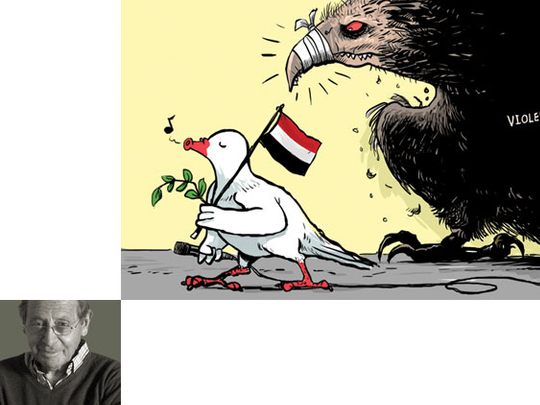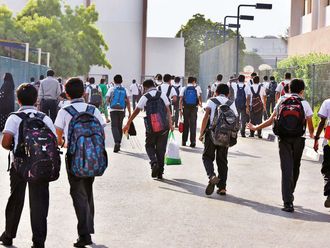
Although politically divided, suffering economic hardship, rent by bitter grievances and burdened by a history of civil conflict, Yemen has chosen to resolve its difficulties by means of a great National Dialogue. It has chosen to talk rather than to fight — a decision of great wisdom.
The date for the dialogue has not yet been announced, but it could begin as early as February and last several months, bringing to the capital Sana‘a 500-600 key personalities from all parts of the country.
Huge hopes rest on the success of this democratic experiment.
A major incentive which has focused Yemeni minds is a pledge by the international community to provide $8 billion (Dh29.36 billion) in aid — if, and only if, the National Dialogue is successful in settling the most glaring inter-Yemeni disputes. The funds are intended to help the government create a climate of security and stability, provide jobs and services, launch economic growth, bring home some at least of the six million Yemenis abroad and nurture the right conditions to attract much-needed inward investment. But for any of this to happen, Yemen must stay united.
Can Syria learn from the Yemeni experience? One cannot help wondering whether a promise of substantial aid by the international community to rebuild Syria after the colossal devastation of the civil war might not encourage the regime and its opponents to end the horrendous killing and give dialogue a chance.
In Yemen, the principal architect of the National Dialogue is President Abd Rabbo Mansour Hadi, who came to power on February 27, 2012, with powerful backing from the Gulf Cooperation Council. He replaced President Ali Abdullah Saleh who had ruled, one way or another, for 33 years — first as president of North Yemen from 1978 to unity with the South in 1990, and then as president of a united Yemen from 1990 to 2012.
Although he no longer sits in the presidential palace, Saleh remains head of his political party, the General People’s Congress. His sons, half-brothers and nephews have retained powerful positions in the military. It was only very recently, in late December 2012, that Hadi issued decrees merging units commanded by Saleh’s relatives and some of their rivals, such as General Ali Mohsin’s 1st armoured division, into a new unified military structure. These commanders have had their wings clipped. But they still remain powerful, if under somewhat tighter control.
The ambitious aim of the National Dialogue is nothing less than to decide what sort of a state Yemen is to be. Should it be a unified country (as was attempted by the 1990 unity agreement) or a federation of North and South — or even a decentralised con-federal state, which might give a measure of autonomy to the many different pieces of the Yemeni puzzle?
Should Yemen’s system of government be parliamentary or presidential? Will the army and security services — all too often divided into rival power centres — continue to play a central role, and often a corrupt one, in the affairs of the country? Or will they be tamed and controlled by a civil state?
What relations should Yemen have with its powerful northern neighbour, Saudi Arabia, the hegemonic power in the Arabian Peninsula? Over the years, Yemen has greatly depended on Saudi financial help. In return, the kingdom has felt the need to have a say in Yemeni affairs if only to prevent Yemeni violence and instability spilling across its border.
In the last couple of years, after a brief war in 2009, the Saudis have greatly strengthened their border defences. Nevertheless, one way or another, Saudi Arabia and Yemen need each other. Their relations will require very careful handling.
Another major concern of the Yemenis is that the US has designated their country as a frontline state in the battle against Al Qaida. Primarily concerned with protecting its own homeland from terrorist attack, the US has carried out muscular interventions against terrorists in Yemen and other countries, notably by means of drone strikes.
As these strikes inevitably kill innocent civilians as well, they have aroused bitter anti-American feeling in parts of the population — a hostility often directed against the Yemeni government, accused of complicity with Washington. To carry the war to Al Qaida, the US has also sought to create a local Yemeni counter-terrorist force, separate from the rest of the armed services.
But this has deepened divisions within the Yemeni military and within Yemeni society as a whole. The extent to which Yemen should cooperate with the US in counter-terrorism poses a tricky dilemma for the Yemen government. It needs American aid, but it cannot ignore the hostility of much of its population to American policies.
These are only some of the difficult subjects which the National Dialogue is expected to discuss. The problems are so great that the dialogue might fail. But the fact that Yemenis have decided to resort to dialogue rather than to violence is very much a step in the right direction — and an example to others.
Perhaps the greatest of all problems facing Yemen is the clashing identities of different parts of the country. Aden and the South — shaped by the British presence from 1839 until 1967 and then by two decades of Marxist rule — were greatly disillusioned by union with the north in 1990. In 1994, the South tried to break loose but was defeated. Today, a powerful southern movement known as Al Hirak, embittered by the corruption, land grabs and aggression of northern tribes, is campaigning for autonomy or even outright secession.
The Hadramout, with its capital at Mukalla, is also seething with anger at the central government, which it feels has abandoned it. Law and order has broken down, the cost of living has spiralled out of control, while US drone attacks enrage the population. Many Hadramis want to break away from Yemen and form their own independent state.
In the north of Yemen, around the city of Sa‘ada, a Zaidi revivalist movement, Al Houthis, rose in rebellion against the central government in 2004 and, in the following years, fought several rounds against the government. It remains untamed. Indeed it seems to have expanded its control over the whole Sa‘ada governorate.
Can a National Dialogue reconcile these profoundly different regions? Can it win over the local populations, deal seriously with their legitimate grievances and mould them into a unitary state? This is the huge challenge facing Hadi and his colleagues. They will need the support of the international community and of their rich Gulf neighbours because a ‘failed state’ in Yemen could threaten the stability of much of the surrounding Arab world.
Patrick Seale is a commentator and author of several books on Middle East affairs.







